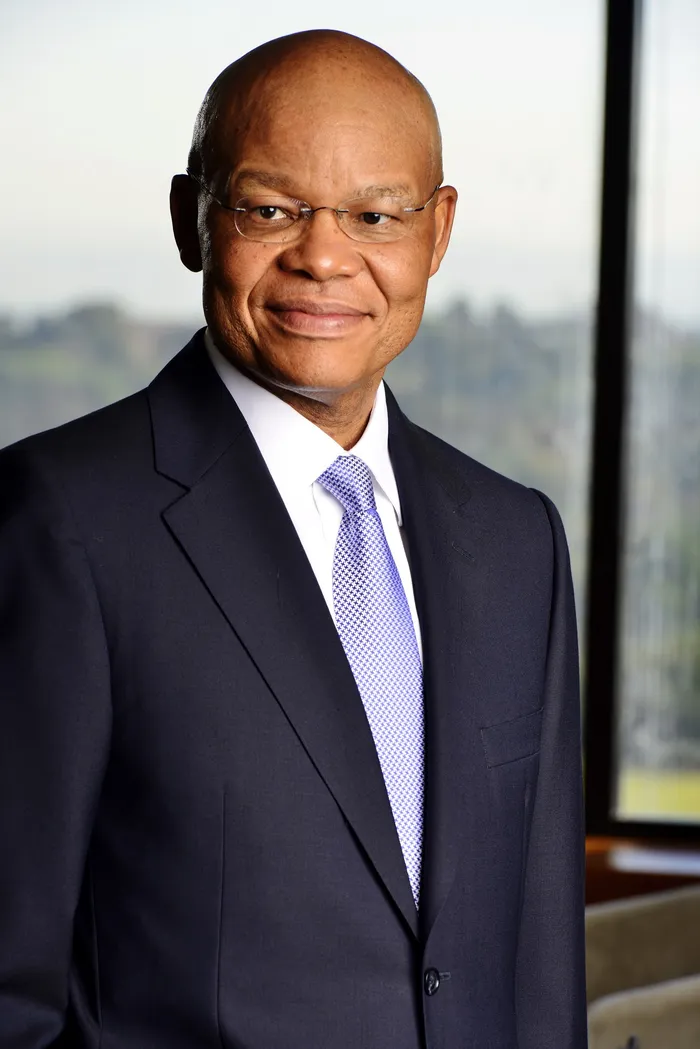
Investec CEO Fani Titi
Image: Supplied
Investec Group increased adjusted earnings by 2.5% to 40.5 pence per share in the 6 months to September 30, which the CEO Fani Titi described as “resilient results in a challenging macroeconomic environment.”
Over 12 months, the international banking and wealth management group returned £376 million (R9 billion) to shareholders, equivalent to 7.4% of the group’s average market capitalisation, via dividends and share buybacks.
An interim dividend of 17.5p per share (16.5p) was declared, representing a 43.2% payout ratio. As part of the capital management process, R1.1bn/£46m of shares from the R2.5bn/£100m share buy-back program that was announced in May 2025 had been repurchased.
“We are progressing well with our strategy to build scale and leverage existing client franchises, allocate capital optimally, and drive investment to enhance our proposition. We have a clear path to achieve incremental return on equity of 200 basis points by the 2030 financial year,” Titi said Thursday.
The group is working on growing its corporate mid-market growth initiatives. “We will bring the private client banking experience to mid-sized corporates, delivered through our differentiated service model and entrepreneurial approach,” said Titi.
Revenue, up 2.6% in rands and down 0.6% in pounds, was supported by ongoing client acquisition, client activity, growth in average lending portfolios, and continued net inflows in discretionary and annuity funds under management (FUM).
Net interest income (NII) benefitted from growth in average lending books and lower cost of funds in Southern Africa as a result of our strategy to optimise the funding pool. This was offset by the impact of lower average interest rates.
Non-interest revenue (NIR) growth reflects a strong increase in fee income generated by the UK Banking business, as well as higher annuity fees from the SA Wealth & Investment business.
Trading income and investment income is behind the comparative period, which benefited from the positive sentiment that followed the Government of National Unity (GNU) formation in South Africa. This was augmented by an increase in the group's share of post-tax profits from associates.
The cost to income ratio was 51.9% (FY2025: 52.6%). Total operating costs increased by 1.5%. Pre-provision adjusted operating profit fell by 2.6% to £527.4m. The group saw good levels of lending origination with strong fee generation, counterbalanced by the negative impact of declining interest rates and lower income from the SA Group investments portfolio.
Return on equity (ROE) was 13.6% (1H2025: 13.9%) within a medium-term 13% to 17% target range. Funds under management (FUM) in the Southern African wealth business increased by 13.4% to £26.5bn.
Strong net inflows in the discretionary and annuity funds of R11.5bn (£478m) were supplemented by R5.2bn (£215m) additional FUM from a strategic acquisition by the Swiss operations in September 2025. This was partly offset by non-discretionary outflows of R7.8bn (£325m).
Associate Rathbones reported Funds Under Management and Administration (FUMA) of £113bn.
For the rest of the year, revenue was expected to be supported by book growth, ongoing client activity, and continued success in client acquisition and entrenchment strategies, partly offset by the impact of lower average interest rates.
Group performance in the second half of the financial year was expected to be broadly in line with the current period, said Titi.
Group return on equity was expected to be 13.7% within the 13% to 17% target range: Southern Africa was expected to report ROE of 18.5%, in the target range of 16% to 20%; UK & Other was expected to report ROTE (return on tangible equity) of 13.6%, within the target range of 13% to 17%.
BUSINESS REPORT